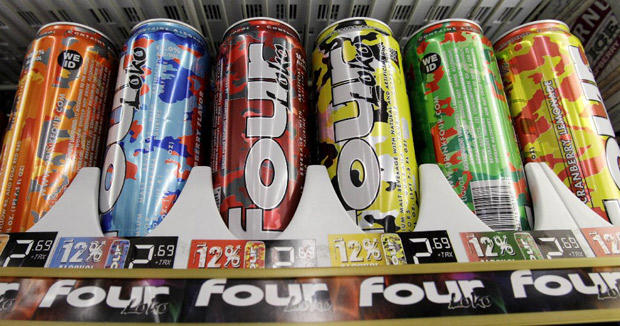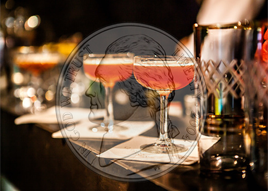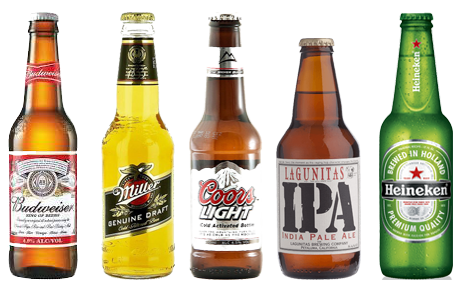Blog
Search
Blog
State AGs to Phusion: Reduce Alcohol Content
October 22, 2015

Along with removing caffeine from its products after the US Food & Drug Administration's warning in late 2010, the company also increased container size and alcohol content. Supersized alcopops also known as "binge in a can" or "blackout in a can" containing nearly 5 standard drinks, have since become the norm, lining the doors of store coolers where alcopops are sold.
Supersized alcopops are associated with increased dangerous drinking behaviors, injuries, and harm to youth.
Earlier this year, Phusion launched Four Loko Gold, a new supersized alcopop with 14% ABV and 23.5-ounce containers, the highest alcohol content of all Four Loko products (equal to 5.5 standard drinks). The company primarily markets Four Loko Gold through social media, where young drinkers flock to in order to gain access to contests and invitation-only, sponsored parties where the new product is served.
Click here to see our report, From Alcoholic Energy Drinks to Supersized Alcopops.
TAKE ACTION: TELL THE FEDERAL TRADE COMMISSION & ALL STATE ATTORNEYS GENERAL: PHUSION MUST REDUCE ITS ALCOHOL LEVEL
MBTA reconsiders alcohol ad ban
October 22, 2015

This, despite the number of young children and youth who ride the T every day, including students who ride it to and from school, and the known risks and harm to youth from increased exposure to alcohol advertising.
In terms of ramping up revenue to close the MBTA deficit gap, alcohol advertising might generate a barely-there $1.3 million, less than 1% of the deficit.
We join former Massachusetts First Lady Kitty Dukakis, Boston Mayor Marty Walsh, The Harvard Crimson, and many local community organizations in opposing a reversal of the MBTA alcohol advertising ban. The MBTA shouldn't throw the health and safety of youth under a bus covered with alcohol ads.
CLICK HERE TO TAKE ACTION TO KEEP THE "T" ALCOHOL AD-FREE
New California Alcohol Tax Bill
September 24, 2015

ABX2-18 would address severe cuts to services for developmentally disabled Californians in the last decade and help the state comply with the Lanterman Act, which requires that such services be provided. A Public Policy Institute of California survey revealed that 62% of likely voters, and 73% of parents with children 18 or younger, support increasing state alcohol taxes.
California tax rates on beer, wine, and spirits are abysmally low, and have not seen an increase since 1991. Since California's alcohol tax rates are not annually indexed to inflation, the state beer tax rate has lost 42% of its value since its last increase. ABX2-18 includes an inflation index.
According to the Alcohol Justice tax calculator, a state nickel-a-drink increase for all types of alcohol would raise $802 million annually. Alcohol Justice supports this bill for raising the price of an under-taxed, harmful product and for raising revenue for health and human services. We also believe that a significant excise tax increase with an inflation index would be very efficient, and Alcohol Justice wiil soon be calling upon Governor Jerry Brown to introduce an increase in the alcohol excise tax in his FY 2016-2017 budget.
Take ACTION on the 5-cent cocktail tax here.
Bigger Big Beer
September 24, 2015

Meanwhile A-B InBev's counterpart and US joint venture MillerCoors LLC continues the trend of Big Beer buying up craft brewers - and California craft, at that. Big Beer continues to stave off threats of market share lost to somewhat smaller breweries, while making these plays to keep distributors in line. MillerCoors acquired Saint Archer’s and is already making plans to extend its brewer distribution beyond the state. Heineken was not far behind, with its new 50% stake relinquished from "smaller" Lagunitas Brewery (valued at roughly $1 billion).
And it doesn't look like the spending spree is ending anytime soon. The findings from our 2009 report echo resolutely in light of these recent beer deals:
- Shareholder rights and decision-making participation continue to disappear.
- Corporate consumption poses significant threats to the US three-tier regulatory system. While beer companies continue to deny interest in controlling beer distribution, they seek to buy distributorships wherever they can and force egregious contract provisions upon distributors who are backed into a corner to comply.
- Big brewers continue to grow and wield their influence on global, federal, state, and local lawmakers. Beer trade associations and allied partners spend millions to oppose the most effective and cost-effective policies to protect communities and reduce alcohol-related harm (increased prices/taxes, reduced availability, and restricted advertising and promotion).
- Beer remains the cheapest, most widely used drug in the U.S.
More Articles ...
Help us hold Big Alcohol accountable for the harm its products cause.
| GET ACTION ALERTS AND eNEWS |
STAY CONNECTED    |
CONTACT US 24 Belvedere St. San Rafael, CA 94901 415-456-5692 |
SUPPORT US Terms of Service & Privacy Policy |
Copyright © 2026 Alcohol Justice. All Rights Reserved.
Joomla! is Free Software released under the GNU General Public License.


